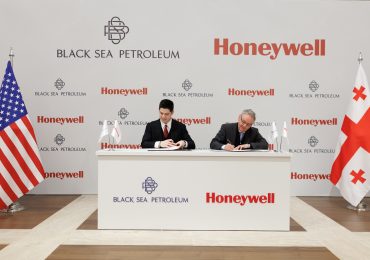Georgia’s foreign policy trajectory under Georgian Dream is a warning. In the current era of great power competition, insecure small states are becoming prime targets for authoritarian manipulation. NATO’s attention to its periphery has lagged — allowing once-reliable partners to drift, hedge, and in some cases, recalibrate entirely.
For Moscow and Beijing, the post-Cold War international order became irrelevant with Russia’s 2022 full-scale invasion of Ukraine. During a visit to the Kremlin in March 2023, Chinese President Xi Jinping told Russian President Vladimir Putin that “… right now [changes] — the likes of which [haven’t] been seen for 100 years,” were occurring, and that they were “… the ones driving those changes together.” Working in tandem alongside other revisionist powers like Iran and North Korea, Russia and China are asserting spheres of influence in their respective regions. Collectively, their long-term aim is to challenge the global hegemony of the United States.
In regions like the South Caucasus, contestation between great powers has created volatility for small states. Many have shifted to postures of strategic autonomy, attempting to balance relations with all powers competing in their region. In doing so, they hope to mitigate vulnerabilities that might force them to align with one power over others; prolonging their sovereignty for as long as possible.
Reversing decades of prior movement towards a Western geopolitical orientation, Georgia has taken what amounts to a pro-Russian stance on the Russo-Ukrainian War. The government refused to formally join Western sanctions against Russia or support Ukraine with military aid. At the same time, they continued to deepen economic ties with Russia through remittances and trade; while placing no restrictions on Russian businesses and citizens that relocated to Georgia after the invasion began.
Publicly, Georgian Dream frames their posture towards Russia as a pragmatic foreign policy choice. Drawing on NATO’s lack of military support during the 2008 August War and lack of security guarantees following, they claim that Georgia cannot rely on the United States and other Western partners for protection. From their view, national survival can only be guaranteed through balancing relations with both Russia and the West; not prioritizing alignment with one over the other.
What explains Georgian Dream’s refusal to align with the Western position on the war, despite facing similar conflict with Russia in the past and ongoing partial occupation like Ukraine? High-level Georgian government officials justify their disengagement as risk-avoidance; preventing the United States and other NATO allies from opening a second front on Georgian territory. This mirrors Russian claims of Ukraine being used to stage a proxy war between Russia and NATO. Georgian Dream’s rhetoric negates Russia’s role as the primary threat to Georgian national security, and the primary aggressor in the region. Under the guise of neutrality, they place the blame for any further escalation of regional tensions on the West.
However, democratic backsliding at the domestic level indicates multiple reasons behind this approach. Particularly since the October 2024 parliamentary elections, Georgian Dream has moved to consolidate a one-party state. Ensuring the continuity of their rule necessitates the government pushing Western democracies that would hold them accountable out of the region.
With their increased isolation from the West resulting in domestic unpopularity, Georgian Dream’s regime survival is at risk. To maintain power, they are actively seeking alliances with other revisionist authoritarians like China and Iran. Enhanced alignment with China, in particular, has given Georgian Dream room to maneuver in the short-term. However, it poses long-term risks to Georgia’s national security and sovereignty; as well as its ability to maintain a posture of strategic autonomy without permanently isolating Western partners.
Ties with China have been primarily deepened through economic investment and trade. Georgia and China signed a Strategic Partnership Agreement in 2023. Soon after, China began investing directly in Georgian strategic infrastructure projects. In May 2024, a Chinese-Singaporean consortium “… won the tender for constructing [Georgia’s first and only] deep-sea port at Ankalia on the Black Sea.” Following that, China expressed interest in building a new Tbilisi airport on the site of the Vaziani airfield and military base. If approved, this would negate Vaziani’s value as a “… key strategic base” for joint military exercises with the U.S. and other NATO partners. Several PRC state-owned companies remain active in building strategically-located transportation infrastructure across Georgia. With these investments, China gains control over key points in East-West trade along the Trans-Caspian International Transit Route (Middle Corridor); with several having the potential for dual military use.
Additionally, in recent months, the Georgian government has purchased significant quantities of Chinese surveillance technologies. Procured from Chinese technology firms like “… Huawei, Hikvision, and Dahua,” AI-driven crowd control and digital surveillance systems have been adopted for internal policing. Said technologies have been directly used to suppress the ongoing anti-Georgian Dream protest movement. Chinese-made customs control systems provided to Georgian border checkpoints in 2024 have further involved Chinese technology directly in Georgia’s national security infrastructure. Through both, China gains access to Georgian civilian and government data; with data leakages presenting a security concern as Russo-Chinese military cooperation continues to deepen.
Georgian Dream has also invested in its relationship with Iran, albeit to a lesser extent than with China. Since they first came to power twelve years prior, “… trade with Iran has tripled… and [the number] of direct investments [has] increased fivefold.” However, any steps towards further economic cooperation raise the risk of Georgian Dream officials facing more sanctions by Western states. Despite this, political ties between the two states have continued to deepen, demonstrating the Georgian government’s increased political neutrality towards anti-Western regimes.
As state capture consolidates domestically, once-steadfast partners are calling out the Georgian Dream government’s “… open challenge to the West” on the international stage. With no demonstrated will for reconciliation, Georgia will continue to lose the security guarantees it requires to avoid becoming “… prey for regional hegemons.”
The Georgian government will continue to seek out alternative security patrons amongst its newfound allies — namely, China. However, relations between fellow revisionist powers (Russia and China, in this case) remain the priority; meaning China will refuse to intercede in any future Russian aggression against Georgia. Ultimately, Georgian Dream’s attempt at a strategic autonomy-based foreign policy only pushes the country closer to Russia’s control; trading short-term regime survival for eventual loss of sovereignty.
Forbes Opinion is a non-editorial category created by individuals with diverse interests and ideas. The texts published within this category represent the views of the authors and may not reflect the position of Forbes Georgia’s editorial team.











